AWM41 1011 - [Nurses Narratives] Staff Nurse E N Miller
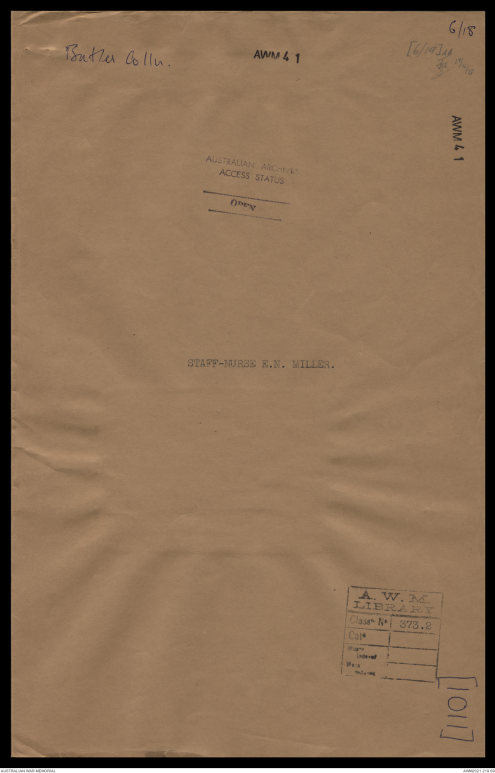
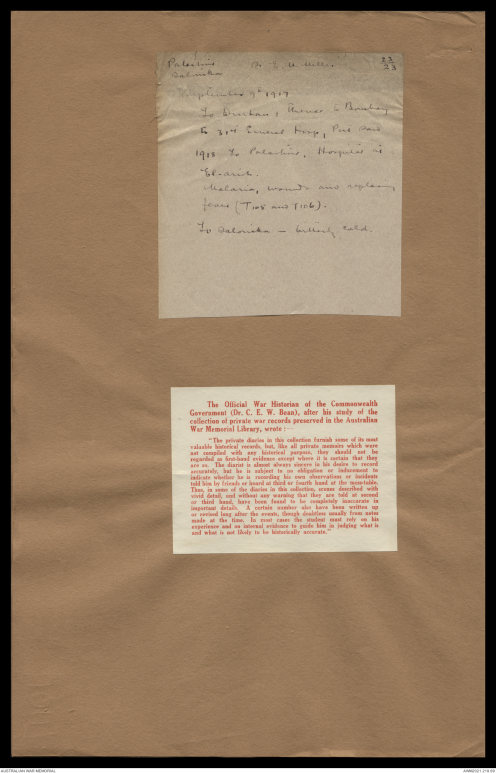
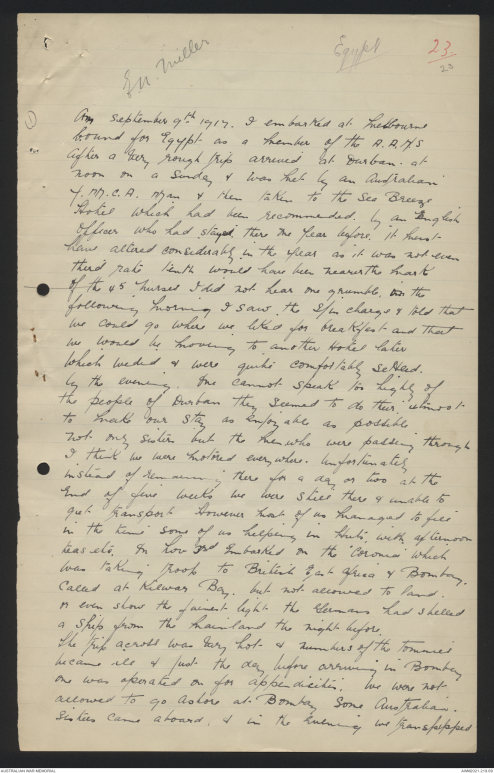
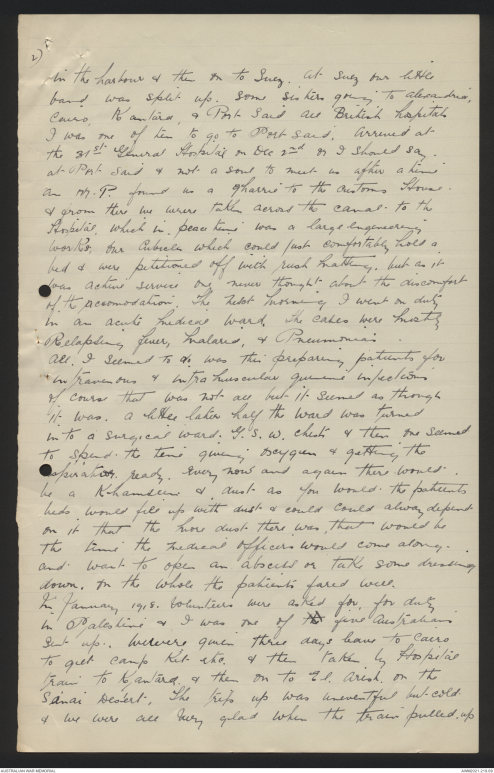
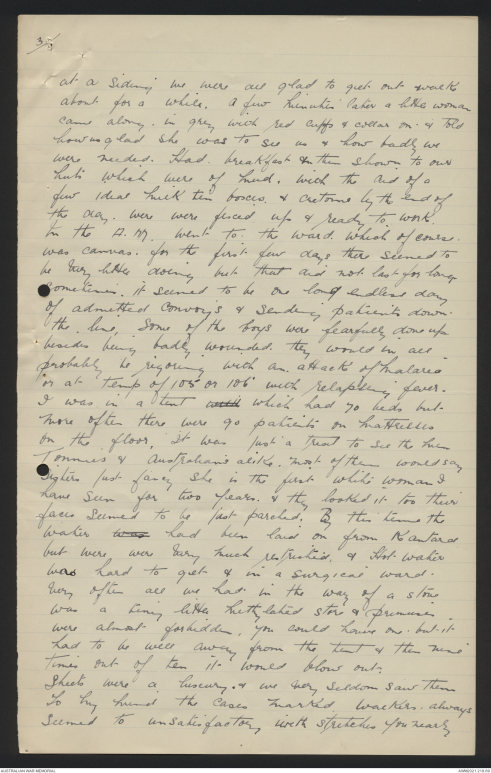
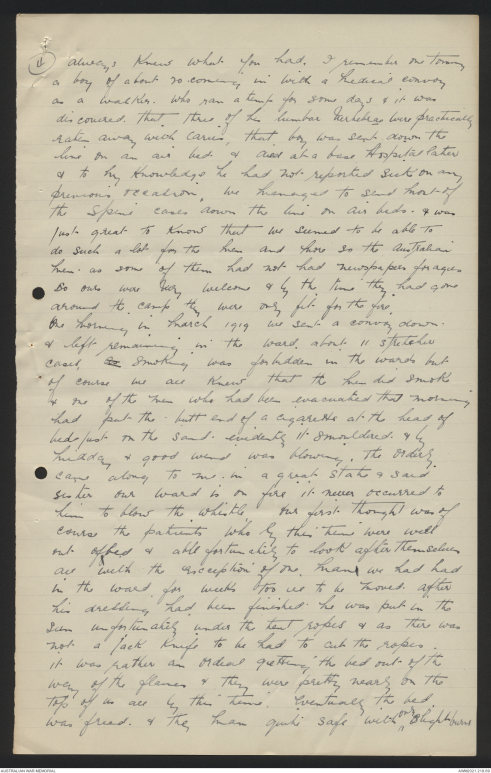
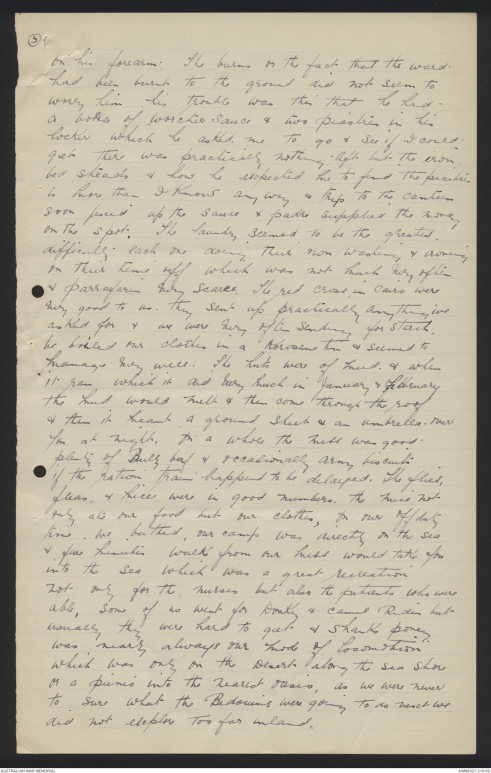
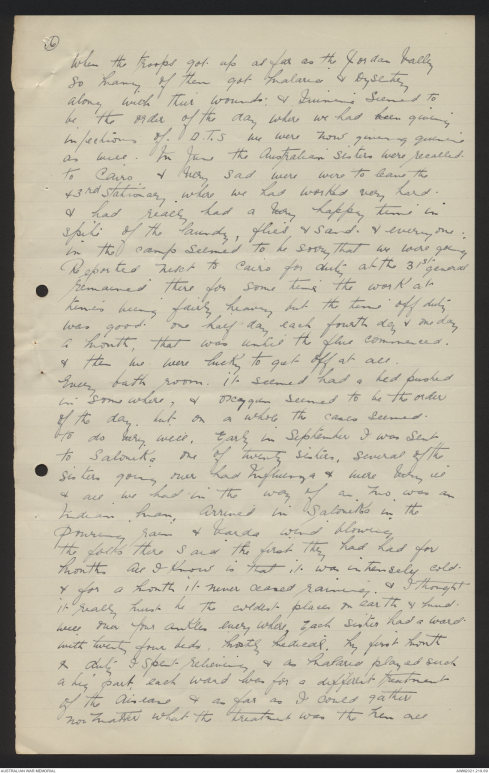
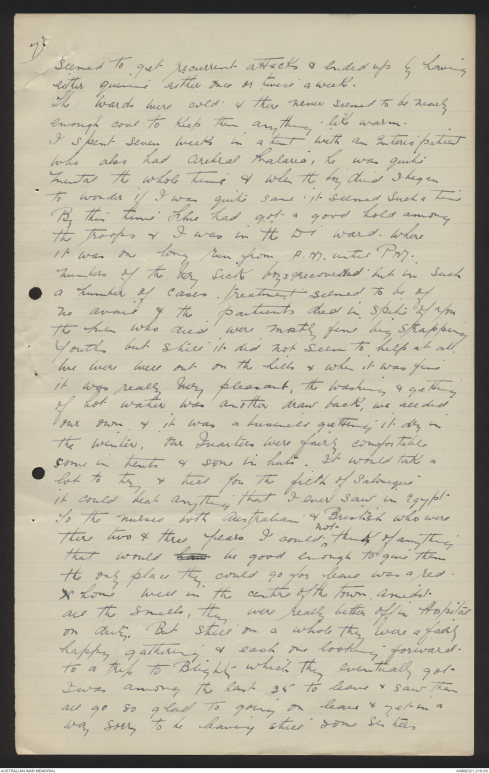
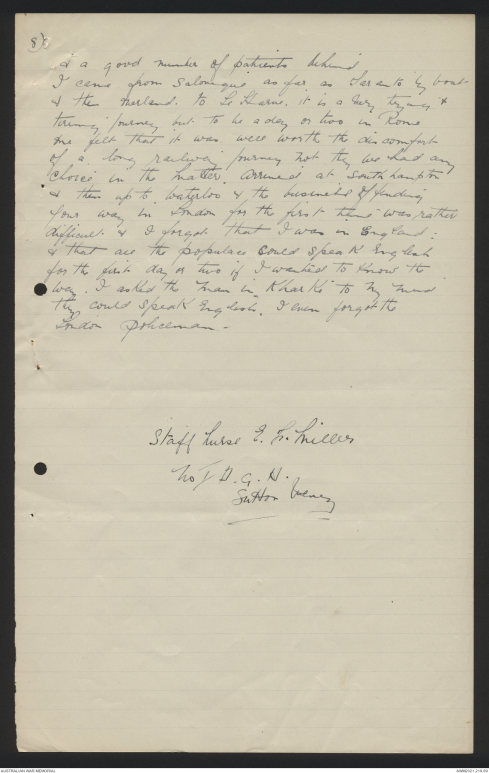
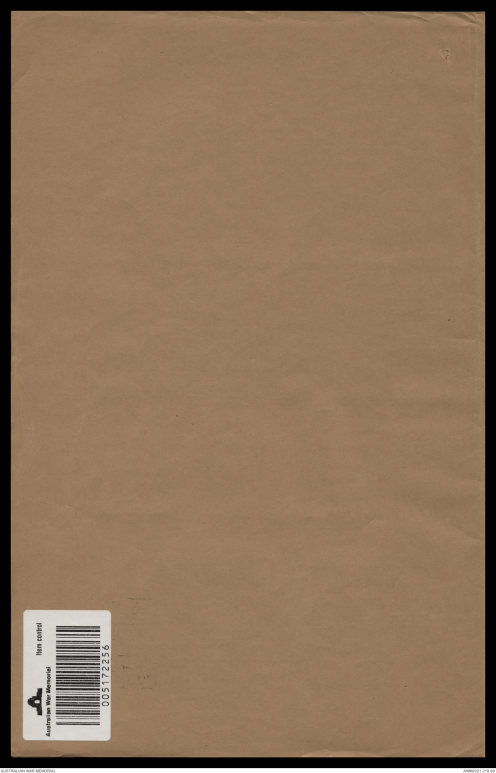
Butler Colln
6/18
[6/19]
[[?]]
AWM 41
AWM 41
AUSTRALIAN ARCHIVES
ACCESS STATUS
OPEN
STAFF-NURSE E.N. MILLER
A. W. M.
LIBRARY
Classn No 373.2
[1011]
Palestine Sr. E.N. Miller. 23/23
Salonika
September 9th 1917
To Durban, Thence to Bombay
to 31st General hosp, Port Said
1918 To Palestine, Hospital at
El-arish.
Malaria, wounds and relapsing
fever (T 108 and T 106).
To Salonika - bitterly cold.
The Official War Historian of the Commonwealth
Government (Dr. C. E. W. Bean), after his study of the
collection of private war records preserved in the Australian
War Memorial Library, wrote :
"The private diaries in this collection furnish some of its most
valuable historical records, but, like all private memoirs which were
not compiled with any historical purpose, they should not be
regarded as first-hand evidence except where it is certain that they
are so. The diarist is almost always sincere in his desire to record
accurately, but he is subject to no obligation or inducement to
indicate whether he is recording his own observations or incidents
told him by friends or heard as third or fourth hand at the mess-table.
Thus, in some of the diaries in this collection, scenes described with
vivid detail and without any warning that they are told at second
or third hand have been found to be completely inaccurate in
important details. A certain number also have been written up
or revised long after the events, though doubtless usually from notes
made at the time. In most cases the student must rely on his
experiences and on internal evidence to guide him in judging what is
and what is not likely to be historically accurate."
E.N. Miller
Egypt
23/23
(1)
On September 9th 1917, I embarked at Melbourne
bound for Egypt as a member of the A.A.N.S
After a very rough trip arrived at Durban at
noon on a Sunday & was met by an Australian
Y.M.C.A man & then taken to the Sea Breeze
Hotel which had been recommended by an English
officer who had stayed there the year before. It must
have altered considerably in the year as it was not even
third rate tenth would have been nearer the mark
of the 45 nurses I did not hear one grumble. in The
following morning I saw the S/in charge & told that
we could go where we liked for breakfast and that
we would be moving to another Hotel later
which we did & were quite comfortably settled
by the evening. One cannot speak too highly of
the people of Durban they seemed to do their utmost
to make our stay as enjoyable as possible.
Not only sisters but the men who were passing through
I think we were motored everywhere. Unfortunately
instead of remaining there for a day or two at the
end of five weeks we were still there & unable to
get transport. However most of us managed to fill
in the time some of us helping in Huts with afternoon
teas etc. On Nov 3rd embarked on the 'Coronia' which
was taking troops to British East Africa & Bombay.
Called at Kilwar Bay. but not allowed to land.
or even show the faintest light the Germans had shelled
a ship from the mainland the night before.
The trip across was very hot & numbers of the Tommies
became ill & just the day before arriving in Bombay
one was operated on for appendicitis. We were not
allowed to go ashore at Bombay Some Australian
sisters came aboard, & in the evening we transhipped
2)
in the harbour & then on to Suez. At Suez our little
band was split up. Some Sisters going to Alexandria,
Cairo, Kantara & Port Said all British hospitals.
I was one of ten to go to Port Said. Arrived at
the 31st General Hospital on Dec 2nd or I should say
at Port Said & not a soul to meet us after a time
an M.P. found us a gharrie to the customs House
& from there we were taken across the canal to the
Hospital which in peace time was a large engineering
works. Our Cubicles which could just comfortably hold a
bed & were partitioned off with rush matting, but as it
was active service one never thought about the discomfort
of the accomodation. The next morning I went on duty
in an acute medical ward. The cases were mostly
Relapsing fever, Malaria, & Pneumonias.
All I seemed to do was the preparing patients for
intravenous & intramuscular quinine injections
of course that was not all but it seemed as though
it was. A little later half the ward was turned
in to a surgical ward. G.S.W. chests & then one seemed
to spend the time giving oxygen & getting the
respirator ready. Every now and again there would
be a Khamseen & dust as you would, the patients
beds would fill up with dust & could could always depend
on it that the more dust there was, that would be
the time the medical officers would come along
and want to open an abscess or take some dressing
down. On the whole the patients fared well.
In January 1918, volunteers were asked for, for duty
in Palestine & I was one of the five Australians
sent up. We were given three days leave to Cairo
to get camp kit etc. & then taken by Hospital
train to Kantara & then on to El Arish on the
Sinai Desert. The trip up was uneventful but cold
& we were all very glad when the train pulled up
3
at a siding we were all glad to get out & walk
about for a while. A few minutes later a little woman
came along in grey with red cuffs & collar on & told
how w glad she was to see us & how badly we
were needed. Had breakfast & then shown to our
huts which were of mud. With the aid of a
few ideal milk tin boxes & cartons by the end of
the day were were fixed up & ready to work.
In the A.M. went to the ward which of course
was canvas. for the first few days there seemed to
be very little doing but that did not last for long.
Sometimes it seemed to be one long endless day
of admitted convoys & sending patients down
the line. Some of the boys were fearfully done up
besides being badly wounded. They would in all
probably be rigoring with an attack of Malaria
or at temp of 105 or 106 with relapsing fever.
I was in a tent with which had 70 beds but
more often there were 90 patients on mattresses
on the floor. It was just a treat to see the men
Tommies & Australians alike. Most of them would say
Sister just fancy she is the first white woman I
have seen for two years. & they looked it too their
faces seemed to be just parched. By the time the
water was had been laid on from Kantara
but were were very much refreshed & hot water
was hard to get & in a surgical ward.
Very often all we had in the way of a stove
was a tiny little methylated stove and primuses
were almost forbidden. You could have one but it
had to be well away from the tent & then nine
times out of ten it would blow out.
Sheets were a luxury, & we very seldom saw them
To my mind the cases marked walkers always
seemed to unsatisfactory, with stretchers you nearly
(4)
always knew what you had. I remember one tommy
a boy of about 20 coming in with a Medical convoy
as a walker who ran a temp for some days & it was
discovered that three of his lumbar vertebrae were practically
eaten away with cancer, that boy was sent down the
line on an air bed and arrd at a base Hospital later
& to my knowledge he had not reported sick on any
previous occasion. We managed to send most of
the spine cases down the line on air beds & was
just great to know that we seemed to be able to
do such a lot for the men and more so the Australian
men as some of them had not had newspapers for ages
so ours was very welcome & by the time they had gone
around the camp they were only fit for the fire.
One morning in March 1919 we sent a convoy down
& left remaining in the ward about 11 stretcher
cases as Smoking was forbidden in the wards but
of course we all knew that the men did smoke
& one of the men who had been evacuated that morning
had put the butt end of a cigarette at the head of
bed just on the sand. evidently it smouldered & by
midday & good wind was blowing, the orderly
came along to me in a great state & said
sister our ward is on fire it never occurred to
him to blow the whistle, our first thought was of
course the patients who by this time were well
out of bed & able fortunately to look after themselves
all with the exception of one manx we had had
in the ward for weeks too ill to be moved after
his dressing had been finished he was put in the
sun unfortunately under the tent ropes & as there was
not a Jack Knife to be had to cut the ropes
it was rather an ordeal getting the bed out of the
way of the flames & they were pretty nearly on the
top of us all by this time. Eventually the bed
was freed & the man quite safe with ∧only slight burns
(5)
on his forearm. The burns or the fact that the ward
had been burnt to the ground did not seem to
worry him his trouble was this that he had
a bottle of worchie sauce & two piastres in his
locker which he asked me to go & see if I could
get there was practically nothing left but the iron
bed steads & how he expected me to find the piastres
is more than I know anyway & trip to the canteen
soon fixed up the sauce & padre supplied the money
on the spot. The laundry seemed to be the greatest
difficulty each one doing their own washing & darning
on their time off which was not much very often
& parrafarin very scarce. The red cross in Cairo were
very good to us. they sent up practically anything we
asked for & we were very often sending for starch.
We boiled our clothes in a Kerosene tin & seemed to
manage very well. The huts were of mud & when
it ran which it did very much in January & February
the mud would melt & then come through the roof
& then it meant a ground sheet & an umbrella. over
you at night On a whole the mess was good.
plenty of Bully beef & occasionally army biscuits
if the ration train happened to be delayed. The flies,
fleas & mice were in good numbers. the mice not
only ate our food but our clothes, on our off duty
time. we bathed, our camp was directly on the sea
& five minutes walk from our mess would take you
into the sea which was a great recreation
not only for the nurses but also the patients who were
able, Some of us went for Donkey & camel Rides but
usually they were hard to get & shanks pony
was nearly always our mode of locomotion
which was only on the Desert along the sea shore
or a picnic into the nearest oasis, as we were never
to sure what the Bedouins were going to do next we
did not explore too far inland.
(6)
When the troops got up as far as the Jordan Valley
so many of them got Malaria & Dysentery
along with their wounds & Quinine seemed to
be the order of the day where we had been giving
injections of D.T.s we were now giving quinine
as well. In June the Australian sisters were recalled
to Cairo & very sad were were to leave the
& 3rd Stationary where we had worked very hard.
& had really had a very happy time in
spite of the laundry, flies & sand. & everyone
in the camp seemed to be sorry that we were going
Reported next to Cairo for duty at the 31st general
remained there for some time the work at
times being fairly heavy but the time off duty
was good. one half day each fourth day & one day
a month, that was until the flu commenced
& then we were lucky to get off at all.
Every bath room it seemed had a bed pushed
in somewhere, & oxygen seemed to be the order
of the day. but on a whole the cases seemed
to do very well. Early in September I was sent
to Salonika one of twenty sisters, several of the
sisters going over had Influenza & were very ill
& all we had in the way of an MO was an
Indian man arrived in Salonika in the
pouring rain & hards wind blowing
The folks there said the first they had had for
months All I know is that it was intensely cold
& for a month it never ceased raining. & I thought
it really must be the coldest place on earth & mud
well over your ankles every where. Each sister had a ward
with twenty four beds. Mostly Medical. My first month
on duty I spent relieving & as Malaria played such
a big part, each ward was for a different treatment
of the disease & as far as I could gather
no matter what the treatment was the men all
7)
seemed to get recurrent attacks & ended up by having
either quinine either once or twice a week.
The wards were cold & there never seemed to be nearly
enough coal to keep them anything like warm.
I spent seven weeks in a tent with an Enteric patient
who also had Cerebral Malaria, he was quite
mental the whole time & when the boy died I began
to wonder if I was quite sane it seemed such a time
By this time Flu had got a good hold among
the troops & I was in the [[Ds?]] ward where
it was one long run from A.M. until PM.
Numbers of the very sick boys recovered but in such
a number of cases treatment seemed to be of
no avail & the patients died in spite of you
the men who died were mostly fine big strapping
youths but still it did not seem to help at all.
We were well out on the hills & when it was fine
it was really very pleasant, the washing & getting
of hot water was another draw back, we all did
our own & it was a business getting it dry in
the Winter. The Quarters were fairly comfortable
some in tents & some in huts. It would take a
lot to try & tell you the filth of Salonique
it could beat anything that I ever saw in Egypt
To the nurses both Australian & British who were
there two & three years I could ∧not think of anything
that would have be good enough to give them
the only place they could go for leave was a red
X home well in the centre of the town amidst
all the smells, they were really better off in Hospital
on duty. But still on a whole they were a fairly
happy gathering & each one looking forward
to a trip to Blighty which they eventually got
I was among the last 25 to leave & saw them
all go so glad to going on leave & yet in a
way sorry to be leaving still some sisters
8)
& a good number of patients behind
I came from Salonique as far as Taranto by boat
& then overland to Le Harve it is a very trying &
tiring journey but to be a day or two in Rome
one felt that it was well worth the discomfort
of a long railway journey not than we had any
choice in the matter. Arrived at Southampton
& then up to Waterloo & the business of finding
your way in London for the first time was rather
difficult & I forgot that I was in England:
& that all the populace could speak English
for the first day or two if I wanted to know the
way. I asked the man in Khaki to my [[mind?]]
they could speak English. I even forgot the
London policeman.
Staff Nurse E. N. Miller
No. 1 D.G.H.
Sutton Veny
Australian War Memorial
Item control
005172256
 Loretta Corbett
Loretta CorbettThis transcription item is now locked to you for editing. To release the lock either Save your changes or Cancel.
This lock will be automatically released after 60 minutes of inactivity.